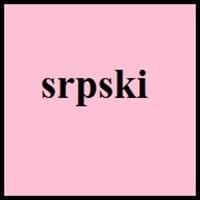Xhosa vs Serbian
Countries
South Africa
Bosnia and Herzegovina, Kosovo, Serbia, Slovakia
National Language
South Africa
Bosnia, Croatia, Montenegro, Serbia
Second Language
Lesotho, South Africa
Not spoken in any of the countries
Speaking Continents
Africa
Europe
Minority Language
Botswana, Lesotho
Croatia, Czech Republic, Hungary, Macedonia, Montenegro, Romania, Slovakia
Regulated By
Not Available
Board for Standardization of the Serbian Language
Interesting Facts
- Xhosa has 15 click sounds, borrowed from the khoi-khoi and san languages of the South Africa.
- The same sequence of consonants and vowels can have different meaning when said with different tones, so Xhosa is tonal.
- Serbian language was derived from the Old Church Salvic, as the language was commonly spoken by most of Slavic people in the 9th Century.
- Serbian language is based on Stokavian dialect.
Similar To
Zulu, Swazi, and Ndebele
Bosnian and Croatian Languages
Derived From
Khoi-Khoi and San Languages
Not Available
Alphabets in
Xhosa-Alphabets.jpg#200
Serbian-Alphabets.jpg#200
Scripts
Latin
Cyrillic, Latin
Writing Direction
Not Available
Left-To-Right, Horizontal
Hello
Molo
Здраво (Zdravo)
Thank You
Ndiyabulela
Хвала лепо (Hvala lepo)
How Are You?
Unjani
Како си? (Kako si?)
Good Night
Ulale kakuhle
Лаку ноћ (Laku noć)
Good Evening
Ubusuku obuhle
Добро вече (Dobro veče)
Good Afternoon
Uben' emva kwemini entle
Добар дан (Dobar dan)
Good Morning
Molo
Добро јутро (Dobro jutro)
Please
Ndicela
Молим (Molim)
Sorry
Ndicela uxolo
Жао ми је (Žao mi je)
Bye
Uhambe/Usale kakuhle
Довиђења (Doviđenja)
I Love You
Ndiyakuthanda
Волим те (Volim te)
Excuse Me
Uxolo
Извините (Izvinite)
Dialect 1
Gcaleka
Prizren-Timok
Where They Speak
South Africa
Southeastern Serbia
Dialect 2
Thembu
Smederevo–Vršac
Where They Speak
South Africa
Serbia
Dialect 3
Hlubi
Torlakian
Where They Speak
South Africa
Bulgaria, France, Kosovo, Macedonia, Romania, Serbia
How Many People Speak
Not Available
Speaking Population
Not Available
Second Language Speakers
Not Available
Native Name
isiXhosa
српски (srpski) српски језик (srpski jezik)
Alternative Names
“Cauzuh” (pej.), Isixhosa, Koosa, Xosa
Montenegrin
German Name
Xhosa-Sprache
Serbisch
Pronunciation
Not Available
[sr̩̂pskiː]
Ethnicity
amaXhosa, amaBhaca
Serbs
Origin
16th Century
11th Century
Language Family
Niger-Congo Family
Indo-European Family
Subgroup
Benue-Congo
Not Available
Branch
Bantu
Not Available
Early Forms
No early forms
No early forms
Standard Forms
isiXhosa
Standard Serbian
Language Position
Not Available
Signed Forms
Signed Xhosa
Not Available
Scope
Individual
Individual
ISO 639 6
Not Available
Not Available
Glottocode
xhos1239
serb1264
Linguasphere
99-AUT-fa
53-AAA-g
Language Type
Living
Living
Language Linguistic Typology
Subject-Verb-Object
Subject-Verb-Object
Language Morphological Typology
Not Available
Not Available
Xhosa and Serbian Language History
Comparison of Xhosa vs Serbian language history gives us differences between origin of Xhosa and Serbian language. History of Xhosa language states that this language originated in 16th Century whereas history of Serbian language states that this language originated in 11th Century. Family of the language also forms a part of history of that language. More on language families of these languages can be found out on Xhosa and Serbian Language History.
Xhosa and Serbian Greetings
People around the world use different languages to interact with each other. Even if we cannot communicate fluently in any language, it will always be beneficial to know about some of the common greetings or phrases from that language. This is where Xhosa and Serbian greetings helps you to understand basic phrases in Xhosa and Serbian language. Xhosa word for "Hello" is Molo or Serbian word for "Thank You" is Хвала лепо (Hvala lepo). Find more of such common Xhosa Greetings and Serbian Greetings. These greetings will help you to be more confident when conversing with natives that speak these languages.
Xhosa vs Serbian Difficulty
The Xhosa vs Serbian difficulty level basically depends on the number of Xhosa Alphabets and Serbian Alphabets. Also the number of vowels and consonants in the language plays an important role in deciding the difficulty level of that language. The important points to be considered when we compare Xhosa and Serbian are the origin, speaking countries, language family, different greetings, speaking population of these languages. Want to know in Xhosa and Serbian, which language is harder to learn? Time required to learn Xhosa is 44 weeks while to learn Serbian time required is 44 weeks.





